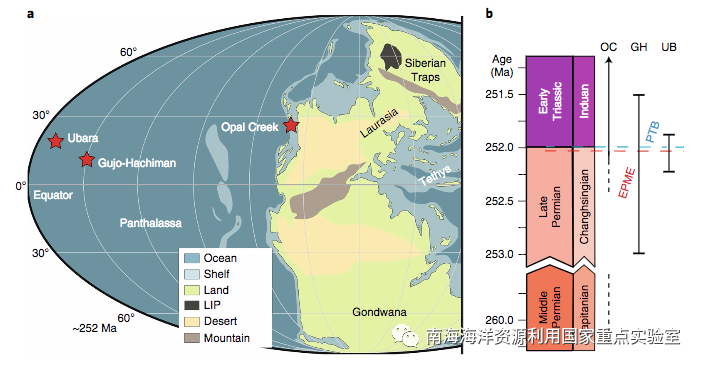二叠纪末大灭绝(EPME)是地球历史上最大的生物危机,发生在约2.5亿年前二叠纪向三叠纪更迭期间,是西伯利亚火山喷发后引起环境扰动的结果,造成了90%海洋物种的灭绝。
The end-Permian mass extinction (EPME), the largest biological crisis intheearth, occurred during the transition from Permian to Triassic about 250 million years ago as a result of environmental perturbations caused by volcanic eruptions in Siberia, resulting in the extinction of 90% of marine species.
主流假说认为,海洋缺氧是造成物种灭绝的主要原因,但其进程和时间具有很大不确定性。最新研究发现,在海洋缺氧前出现了短暂的大氧化事件。
A leading hypothesis links the marine mass extinction to the expansion of oceanic anoxia, although uncertainties exist as to the timing and extent. Recent studies have found that a brief major oxygenation preceded oceanic anoxia.
2021年8月2日,来自美国佛罗里达州立大学的研究人员在国际顶尖期刊《Nature Geoscience》上在线发表了一篇名为“Transient ocean oxygenation at end-Permian mass extinction onset shown by thallium isotopes”的研究论文,文章的中文译名是《铊同位素显示二叠纪末大灭绝开始时的短暂海洋氧化作用》。
On August 2, 2021, researchers from Florida State University published a paper online entitled “Transient ocean oxygenation at end-Permian mass extinction onset shown by thallium isotopes” whose Chinese title was《铊同位素显示二叠纪末大灭绝开始时的短暂海洋氧化作用》in the leading international journalNature Geoscience.

在分析了泛大洋盆地三个地点的铊同位素数据后,研究人员发现,基于某些因素驱动了铊同位素的短暂波动,意味着大灭绝发生时存在一个更加复杂的氧化还原环境。
After analyzing thallium isotopes from three sites in the Panthalassa, the largest ocean basin at the time, researchers found that a more complex redox environment existed at the time of the mass extinction based on the transient fluctuations in thallium isotopes driven by certain factors.
对此,文章的主要作者Sean M. Newby认为,“氧化事件可能与短暂的变冷有关,在EPME期间,海洋系统对火山引起的高度波动产生了响应。”。
As to this issue, Sean M. Newby, lead author of the paper, argues “This oxygenation event may have been related to a transient cooling episode, based on published oxygen isotope records. These findings show that the Earth system experienced a highly fluctuating response to forcings linked to volcanogenic volatiles during the EPME.”
作者Sean M. Newby是佛罗里达州立大学地球海洋与大气科学学院,国家强磁场实验室的研究员。据悉,研究的起源来自于日本和加拿大地区还保存着的二叠纪-三叠纪过渡期间赤道附近的海洋地壳,这块地壳有2.5亿年历史,地壳样本位置如下图所示。
Sean M. Newby is a research professor of Earth, Ocean, and Atmospheric Science Department and National High Magnetic Field Laboratory of Florida State University. The study is said to originate from marine crust near the equator during the Permian-Triassic transition that is still preserved in areas of Japan and Canada. The crust has existed for more than 250 million years old, and its site is shown in the map below.

铊同位素是一种新的古氧化还原替代物,在全球海水中分布广泛、停留时间短,并且能够敏感响应海洋地壳氧化还原变化。在采集了岩石样本并挖掘了现有数据库之后,远古岩石中保存的铊同位素差异提供了数亿年前氧化还原线索。
Thallium isotope is a new kind of ancient redox proxy that is widely distributed in global seawater. It has a short residence time and it is sensitive to redox changes in the oceanic crust. After collecting rock samples and searching existing databases, the differences in thallium isotopes preserved in ancient rocks make redox clues hundreds of millions of years ago available.
【注:同位素是一种化学元素的原子,原子核内的质子数相同,但中子数不同。】
[Note: An isotope is an atom in which the number of protons is the same but the number of neutrons is different.]
在对岩石剖面中的铊同位素进行分析后,发现在EPME之间存在短暂的铊同位素的负偏移,随后表现出向正值的转变,并持续到最三叠纪早期,铊同位素的负偏移指示氧化锰的埋藏,表明在EPME之间存在快速且短暂的海洋氧化事件,如下图所示。
Analysis of thallium isotopes in rock profiles revealed a transient negative shift in thallium isotopes during EPME, which then exhibited a shift to positive values and continued into the early Triassic. The negative shift in thallium isotopes indicated burial of manganese oxides, suggesting a rapid and transientoxygenation during EPME as shown in the figure below.

作者提出了两种可能增加锰氧化物掩埋的原因:第一,EPME期间发生过海平面上升,该海水入侵通过淹没大陆架扩大了含氧海底的面积;第二,EPME开始时有过短暂的气候变冷,与短期铊同位素扰动同时发生。
Sean M. Newby suggested two possible reasons for the increased burial of manganese oxides. Firstly, sea level rose during EPME that seawater intrusion expanded the area of the oxygenated seafloor by inundating the continental shelf. Secondly, there was a transient cooling episode at the beginning of EPME that coincided with a short-term thallium isotopes fluctuation.
然而,研究人员认为第一个原因不足以引起EPME附近海洋大而快速的氧化还原波动。因此第二个原因可能是引起锰氧化物埋藏增加的主要原因:由火山喷发产生的大量SO2触发的短期气候变冷,变冷可以造成冷水下沉并增加海水中的溶解氧,从而促进温盐循环,增强锰氧化物的埋藏。
However, researchers concluded that the first reason was not sufficient to give rise to the large and rapid redox fluctuations in the ocean near EPME. Therefore, the second reason may be more convincing in that the transient climate cooling triggered by large amounts of SO2 from volcanic eruptions can cause cold water to sink and increase dissolved oxygen in seawater, thus promoting thermohaline cycling and enhancing the burial of manganese oxides.
进而研究人员提出了铊同位素记录的二叠纪-三叠纪海洋氧化还原变化模型,如下图所示:二叠纪中期海洋与现代海洋环境相似(a);二叠纪末期火山爆发导致的温度升高,使得海洋缺氧区扩张进而导致溶解的锰含量升高(b);EPME期间二氧化硫排放量的增加介导的海洋短期变冷,导致快速且短暂的海洋氧化事件发生从而增加了锰氧化物的埋藏(c);EPME期间海洋快速恢复了广泛的缺氧条件,并持续到三叠纪早期(d)。
The researchers then proposed a Permian-Triassic model of redox changes in the ocean from the thallium isotope records. (a) The mid-Permian marine environment was similar to that in modern times; (b) The increased temperatures due to volcanic eruptions at the end of the Permian expanded the oceanic anoxic zone, leading to higher dissolved manganese; (c) The transient cooling mediated by increased SO2 emissions during EPME led to rapid and transient ocean oxygenation that increased burial of manganese oxides; (d) A rapid return to widespread anoxic conditions during EPME that persisted into the early Triassic.

该研究表明,EPME期间的氧化还原历史比之前推断的更为复杂。全球气候和海洋氧化还原状态中的这些扰动表明,EPME不仅仅是由向更缺氧的海水过渡引起的,而且是由快速氧化还原波动以及极端温度变化引起的。
This study suggested that the redox history during EPME was more complex than previously inferred. These perturbations in the global climate and ocean redox state suggest that EPME was caused not only by the transition to more anoxic seawater, but also by rapid redox fluctuations as well as extreme temperature changes.
总之,这些极端环境压力影响了许多海洋生物进化,包括那些在EPME之前就早已经适应这些环境条件的生物。
In summary, these extreme environmental stresses have influenced the evolution of many marine organisms, including those that adapted to these environmental conditions long before EPME.
参考文献:https://www.nature.com/articles/s41561-021-00802-4.pdf
简述翻译者:海南大学研究生李凤莹